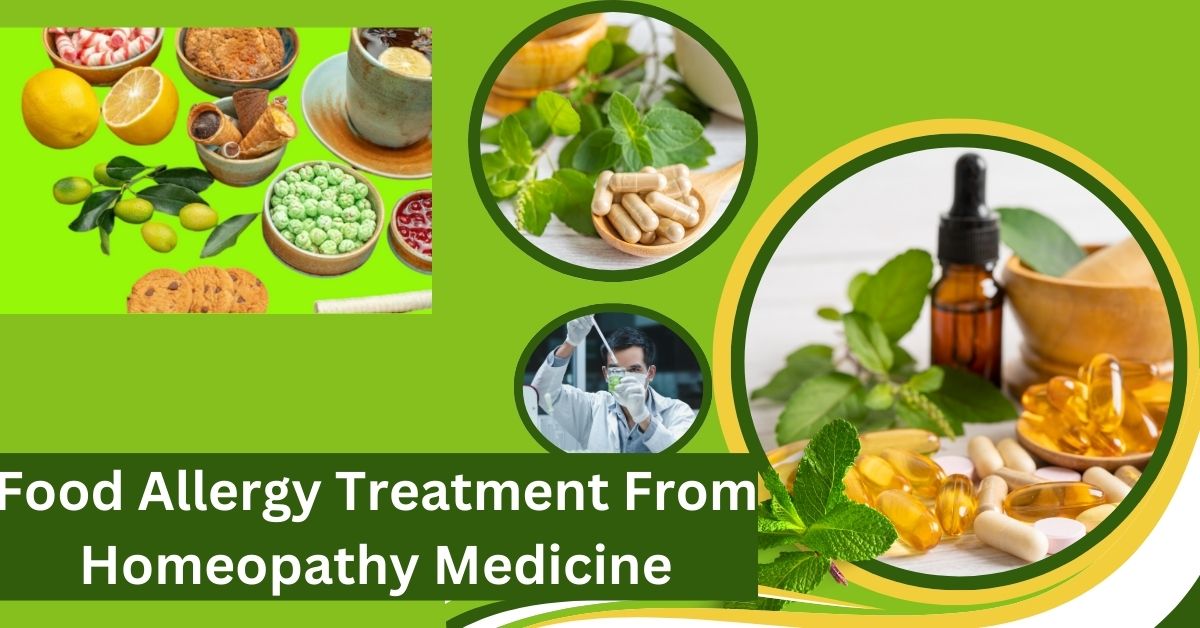Food allergies may have a substantial negative influence on day-to-day functioning and cause suffering and agony to a great number of people. As an all-encompassing alternative to traditional treatments, homeopathy concentrates on promoting the body’s own healing processes while frequently involving drugs and rigorous avoidance of allergens. Using extremely diluted chemicals to address the underlying imbalances in the body, homeopathic treatment cures food allergies. Homeopathy seeks to promote general well-being and lessen sensitivity by customizing medicines to each individual’s distinct symptoms and constitution. In an effort to provide long-term relief from allergic responses, this strategy prioritizes individualized care and may present a more gentle and customized therapy choice.
What types of food allergies
There are various kinds of food allergies, which are mostly classified based on the kind of immunological reaction they cause. Typical kinds include of:
IgE-mediated allergies: These allergic reactions are characterized by an instantaneous response in which the body creates IgE antibodies in response to a particular meal, resulting in symptoms including swelling, hives, or anaphylaxis.
Non-IgE-Mediated Allergies: These reactions affect different immune system components and happen more slowly. Gastrointestinal symptoms, such as diarrhea or vomiting, and disorders such eosinophilic esophagitis, may be present.
Mixed IgE and Non-IgE-Mediated Allergies: A variety of symptoms can result from food allergies that elicit both immediate and delayed immune responses.
Food Intolerances: Although not actual allergies, intolerances can result in symptoms akin to bloating or stomach pain and frequently entail challenges with the digestion of particular foods, like
Symptoms of a Food Allergy
Symptoms of a food allergy can vary in severity and may appear shortly after consuming the allergen. Common symptoms include:
Skin Reactions: Hives, itching, or swelling.
Digestive Issues: Nausea, vomiting, or diarrhea.
Respiratory Problems: Runny or stuffy nose, coughing, or wheezing.
Anaphylaxis: A severe, potentially life-threatening reaction with symptoms like difficulty breathing, rapid heartbeat, and a drop in blood pressure. Symptoms can range from mild to severe and may require immediate medical attention, especially in cases of anaphylaxis. Identifying and avoiding trigger foods is crucial for managing these reactions.
Causes
The goal of homeopathic therapy for food allergies is to address the underlying factors that trigger the body’s reactivity. Food allergies, according to homeopathy, can be caused by:
An immune system imbalanceAn: excessively active or misguided immune response to specific meals is known as.
Genetic Predisposition: An inherited propensity that makes people more likely to experience allergic reactions.
Environmental Factors: Contact with irritants or allergens that might cause sensitivity.
Digestive Health: Disturbances in the gastrointestinal tract that impact the body’s capacity to endure food.
By employing extremely diluted: ingredients to encourage the body’s own healing processes, homeopathic treatments seek to address these imbalances, reducing sensitivity and enhancing immune function overall.
Food Allergy Cure Homeopathy
Because homeopathy treats the underlying causes of food allergies, it provides a distinctive method of treating the illness. Homeopathic treatments try to regulate the immune system and lessen susceptibility to allergens rather than only treat symptoms. Highly diluted medications that are tailored to the patient’s individual symptoms and general health are used in treatment. Over time, homeopathy aims to reduce allergy reactions and increase tolerance to specific foods by promoting the body’s natural healing mechanisms. This approach prioritizes individualized treatment and seeks for long-term solutions as opposed to band-aid solutions.
Common Homeopathic Remedies for Food Allergies
For food allergies, common homeopathic treatments include:
Apis Mellifica: Frequently used to treat symptoms such as swelling, itching, and hives.
Allium Cepa: Treats runny nose and watery, itchy eyes, comparable to hay fever.
Arsenicum Album: Beneficial for scorching pain and stomach problems.
Natrum muriaticum: Used to treat allergic skin reactions and emotional stress.
Lactuca Virosa: May be useful in treating gastrointestinal issues brought on by certain foods.
Potential Benefits and Limitations of Homeopathy for Food Allergies
The individualized method of homeopathy, which customizes treatments to each patient’s symptoms and general health, may help resolve underlying imbalances in addition to other benefits for food allergies. Because the medicines are greatly diluted, there are typically little adverse effects and a comprehensive approach to allergy management can be provided.One of its drawbacks is that there isn’t enough solid scientific proof to back up its efficacy in treating food allergies. Additionally, homeopathy may take longer to produce benefits than traditional medicine and, especially in more serious circumstances, should not be used in place of standard medical care. Before relying exclusively on homeopathic treatments, people should speak with a healthcare provider to ensure proper diagnosis and continued care.
Homeopathic Approach to Food Allergies
In order to encourage the body’s natural healing processes, very diluted chemicals are used in the homeopathic approach to food allergies. Rather than only treating symptoms, this approach targets the immune system’s underlying abnormalities. A homeopath chooses treatments based on the patient’s overall constitution, medical history, and specific symptoms. Through gradual enhancement of tolerance and reduction of sensitivity, homeopathy seeks to treat each patient according to their unique response to allergens. This therapy seeks long-term healing and encourages a comprehensive approach to health, although it should be used in conjunction with traditional methods, particularly in severe instances.
Long-Term Management of Food Allergies with Homeopathy
Homeopathy requires a comprehensive and customized approach for the long-term care of food allergies. By employing highly diluted medicines customized to each person’s unique symptoms and constitution, this technique tries to progressively increase the body’s tolerance to allergens. Treatments can be modified in response to evolving symptoms and progress with the support of routine consultations with a homeopath. Although homeopathy aims to gradually lessen sensitivity and resolve underlying imbalances, it is important to maintain avoiding known allergies and to keep an eye out for extreme reactions. Safe, all-encompassing care can be guaranteed by combining homeopathy with traditional medical guidance.
Key Homeopathic Remedies for Common Food Allergies
Important homeopathic treatments for typical food allergies consist of:
Apis Mellifica: Beneficial for hives, rashes, and swelling, particularly in cases where they appear suddenly and intensely.
Allium Cepa: Good for runny nose and watery eyes associated with allergic rhinitis, frequently brought on by allergens in the environment.
Arsenicum album: Alleviates burning sensations, nausea, and upset stomach, which are frequently caused by food allergies.
Natrum Muriaticum: Treating rashes on the skin and psychological strain caused by dietary sensitivities.
Lactuca virosa: Helpful for discomfort associated with food intolerance and digestive problems.
Safety and Side Effects of Homeopathic Remedies
Because homeopathic medicines for food allergies are greatly diluted and therefore have less negative effects, they are typically regarded as safe. For the correct choice and dose of remedies, it is imperative to speak with a licensed homeopath. Although they are infrequent, potential side effects could include an initial slight escalation of symptoms. Particularly for severe allergies, homeopathy should be used in addition to conventional treatments rather than in substitute of them. Continue to stay away from recognized allergies and keep an eye out for any negative responses. Frequent visits assist in modifying therapy and addressing any emerging issues.
FAQ
FAQ for Homeopathic Food Allergies Treatment:
What is homeopathy?
Homeopathy is a holistic approach using highly diluted substances to stimulate the body’s natural healing processes.
How does homeopathy treat food allergies?
It aims to address the underlying immune system imbalances causing allergic reactions, rather than just managing symptoms.
Is homeopathy effective for food allergies?
Effectiveness varies; while some find relief, scientific evidence is limited. It is best used alongside conventional treatments.
Are there any side effects?
Side effects are rare due to the high dilution of remedies but can include temporary symptom aggravation.
How long does treatment take?
Results can vary; improvement may take weeks to months. Regular follow-ups with a homeopath are essential.
Can homeopathy replace conventional allergy treatments?
No, homeopathy should complement, not replace, standard medical care, especially for severe allergies.
Conclusion
To sum up, homeopathic therapy for food allergies provides an individualized, all-encompassing strategy meant to address the underlying causes of allergic responses. Through the use of highly diluted remedies customized to each patient’s unique symptoms and condition, homeopathy gradually aims to lessen sensitivity and increase tolerance. Although this approach has proven helpful for individuals, it is important to remember that there is limited scientific data and that outcomes can differ. Particularly in severe situations, homeopathy should be used in addition to traditional allergy therapies, not in place of them. An all-encompassing approach to controlling food allergies is ensured by seeing a trained homeopath and continuing with normal medical therapy.

